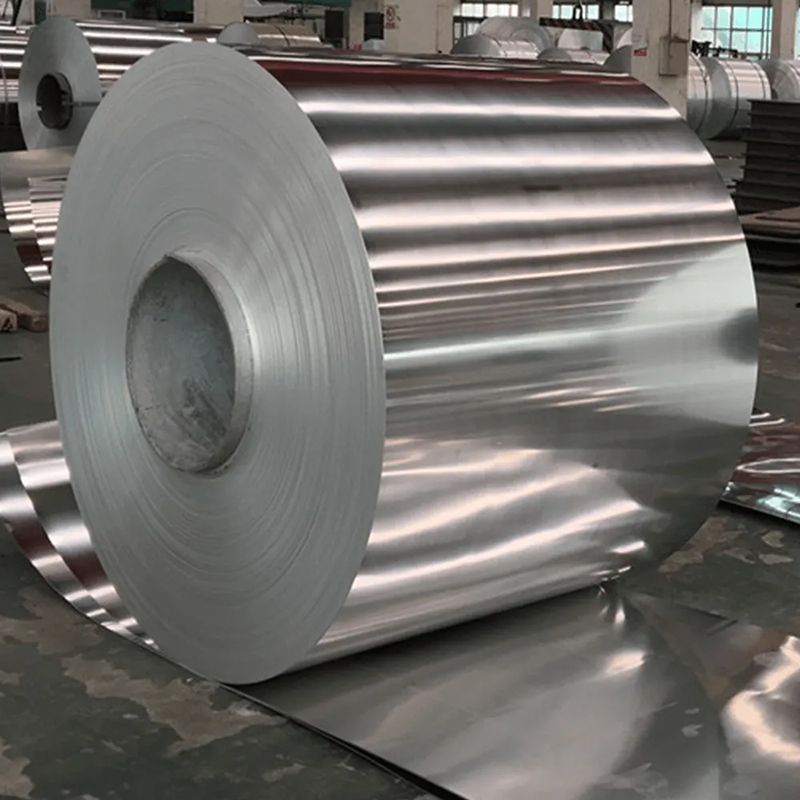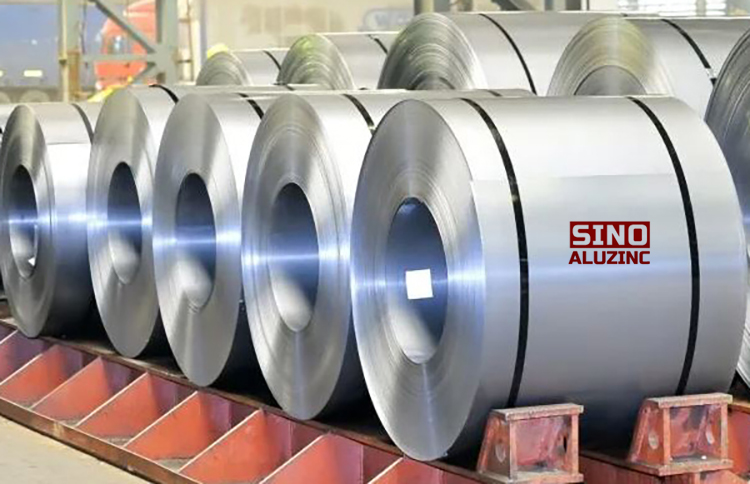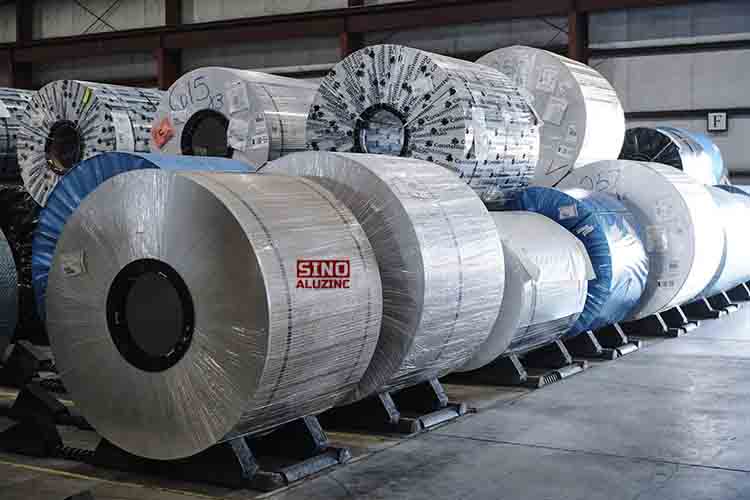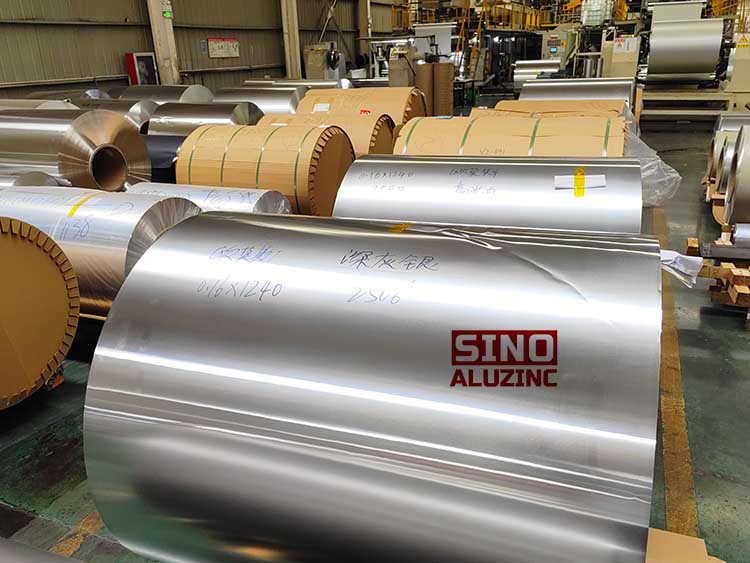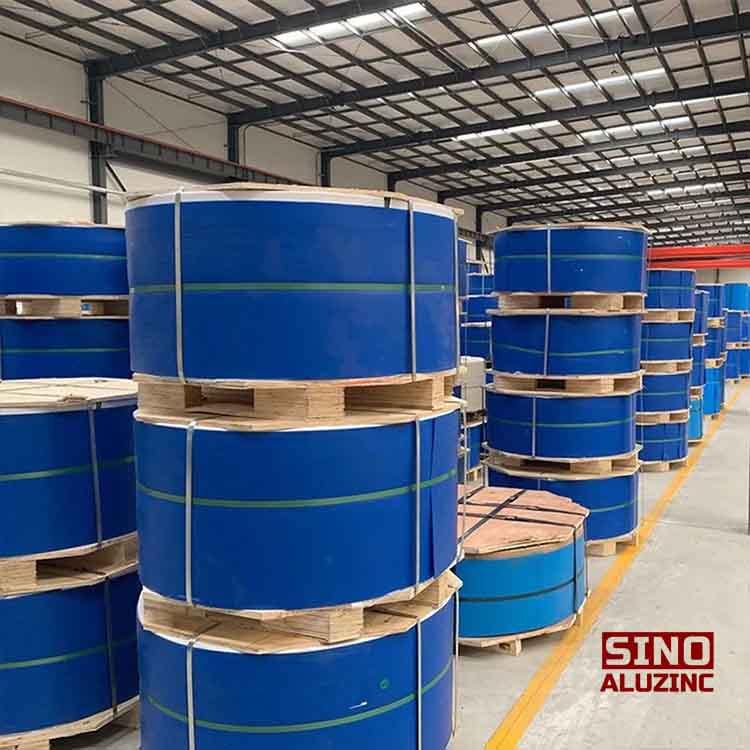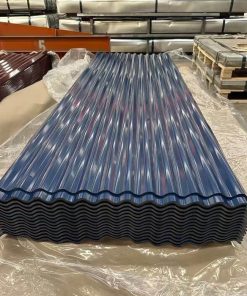Description
Aluminum coils can be produced from aluminum ingots or other forms of raw aluminum (called cold rolling or direct cast) or from a smelting process directly through rolling (called continuous cast). These sheets of rolled aluminum are then rolled up, or coiled, around a core. These coils are densely packed, making them easier to ship and store when compared to aluminum in sheet form. Coil is used to manufacture an almost unlimited range of components used in an extensive number of industries.
Pure aluminum is too soft for most manufacturing applications. Therefore, most aluminum coils are manufactured and supplied as an alloy. These alloys composed of at least two or more elements of which at least one is aluminum. Aluminum alloys for sheet products are identified by a four digit numerical system which is administered by the Aluminum Association. When alloyed with other metals, aluminum’s mechanical and other properties can be tailored to meet specific requirements for strength, formability, and other properties.
Advantages
- Weight – The biggest advantage of aluminum coils has over most competing materials with similar properties is its lighter weight. This makes it ideal for applications such as auto, aerospace and others where total product weight is of concern. It’s also more economical to ship as a result.
- Workability – aluminum is very malleable, meaning it could easily be formed, stamped or shaped as needed. Its workability and versatility contribute greatly to its popularity. Aluminum is preferred for many manufacturing processes, such as drawing, roll forming, and stamping.
- Corrosion Resistance – it also is resistant to corrosion and rust, giving it a significant edge over steel.
- Value – aluminum costs considerably less than materials such as copper, allowing manufacturers to keep material expenses down without sacrificing performance.
- Recyclability – aluminum is easily recycled allowing it to be used again and again thus reducing environmental impact.
- Conductive Properties – Aluminum is a good conductor of heat and electricity. When measured by equal cross-sectional area, electrical grade aluminum has conductivity equal to 62% of electrical grade copper. However when compared using equal weights of both, the conductivity is 204% of copper.
What Are The Types And Grades of Aluminum Coils?
Aluminum coils are available in various grades, such as the 6000 series, 7000 series, 8011 series, and 3000 series, among others. These grades are determined by their composition and intended manufacturing uses. The specific properties of each grade, like hardness or pliability, make them suitable for different industries. To choose the right grade of aluminum coil, it’s essential to understand the intended application and the fabrication or welding processes required for that particular type of aluminum.
1000 Series Aluminum Coil
To be classified as 1000 series aluminum, a product must contain at least 99.5% pure aluminum, qualifying it as commercially pure aluminum. While 1000 series aluminum cannot be heat-treated, it offers excellent workability, superior corrosion resistance, and high electrical and thermal conductivity. It can be welded with specific precautions, but heating does not affect its appearance, making it challenging to differentiate between cold and hot material when welding. The most common 1000 series grades on the market are 1050, 1100, and 1060. These grades are often used for manufacturing cookware, curtain wall panels, and decorative building elements.
2000 Series Aluminum Coil
The 2000 series aluminum coils are alloyed with copper and undergo precipitation hardening to attain strengths comparable to steel. Typically, these coils contain between 2% and 10% copper, along with small amounts of other elements. They are widely used in the aerospace industry for manufacturing aircraft due to their strength and light weight.
2024 Aluminum
The 2024 aluminum alloy primarily uses copper as its main alloying element. It is ideal for applications requiring a high strength-to-weight ratio and excellent fatigue resistance. Commonly found in aircraft structural components like fuselages and wing structures, it is also used in aviation fittings, truck wheels, and hydraulic manifolds. While it offers good machinability, it can only be joined through friction welding. Its appearance remains unchanged when heated, making it challenging to distinguish between cold and hot material.
3000 Series Aluminum Coil
Manganese is the primary alloying element in 3000 series aluminum alloys, although it is usually added in small amounts. This series is typically non-heat treatable, resulting in a material that is more brittle than pure aluminum but offers good formability and corrosion resistance. 3003 and 3004 are the most common alloys in this series, used for applications such as beverage cans, chemical apparatus, hardware, storage containers, and lamp bases. They are valued for their strength, corrosion resistance, formability, workability, and drawing properties that facilitate sheet metal forming.
4000 Series Aluminum Coil
The 4000 series aluminum alloys are characterized by high silicon content and are generally used for sheets, forgings, welding, and brazing rather than extrusion. The addition of silicon lowers the melting point and increases the flexibility of aluminum, making it well-suited for die casting.
5000 Series Aluminum Coil
The 5000 series aluminum coil is renowned for its smooth surface and exceptional deep-drawability. This series is favored for various applications due to its increased hardness compared to other aluminum sheets. Its strength and fluidity make it ideal for heat sinks and equipment casings. Additionally, the 5000 series offers excellent corrosion resistance, making it suitable for mobile homes, residential wall panels, and other applications. Key alloys in this series include 5052, 5005, and 5A05, all of which are characterized by their low density and high tensile strength, leading to widespread industrial use.
Particularly in marine environments, the 5000 series aluminum coil stands out due to its significant weight savings compared to other aluminum series. It is also highly resistant to acid and alkali corrosion, making it a preferred choice for marine applications.
5754 Aluminum Coil
5754 aluminum alloy primarily contains magnesium and chromium. It cannot be produced using casting methods but is instead made through rolling, extrusion, and forging. Known for its excellent corrosion resistance, particularly in seawater and polluted environments, it is commonly used in automotive body panels, flooring, shipbuilding, and food processing applications.
6000 Series Aluminum Coil
The 6000 series aluminum coil, represented by the 6061 alloy, is composed mainly of silicon and magnesium. 6061 aluminum is a cold-treated forging product suitable for applications requiring high oxidation and corrosion resistance. It features excellent interface properties, ease of coating, and good workability, making it ideal for aircraft joints and low-pressure armaments. Its resistance to iron-related issues is enhanced by its manganese and chromium content. Sometimes, small amounts of copper or zinc are added to increase strength without significantly compromising corrosion resistance. 6061 aluminum coils are known for their high strength, excellent serviceability, and strong corrosion resistance.
Aluminum 6062, a wrought alloy featuring magnesium silicide, is heat-treated to enhance its hardness. It is suitable for manufacturing submarines due to its corrosion resistance in both fresh and saltwater environments.
7000 Series Aluminum Coil
The 7000 series aluminum coil is highly advantageous for aeronautical applications due to its low melting point and excellent corrosion resistance. These traits make it well-suited for demanding applications. The majority of 7000 series alloys are composed of Al-Zn-Mg-Cu, which are favored by the aerospace industry and other high-performance sectors for their superior strength among all aluminum series. Additionally, these alloys are valued for their high hardness and resistance to corrosion, making them ideal for various manufacturing needs, including radiators, aircraft components, and other critical parts.
7075 Series Aluminum Coil
Zinc serves as the main alloying ingredient in the 7075 aluminum alloy. It demonstrates exceptional ductility, high strength, toughness, and good resistance to fatigue in addition to having outstanding mechanical qualities.
The 7075 series aluminum coil is commonly used in the manufacture of aerospace components such as wings and fuselages. Its high strength-to-weight ratio makes it advantageous across various industries. Additionally, 7075 aluminum alloy is popular in the production of bicycle parts and rock climbing equipment due to its durability and lightweight properties.
8000 Series Aluminum Alloy Coil
The 8000 series aluminum coil is another versatile model, primarily composed of alloys such as lithium and tin. Additional metals can be included to enhance the stiffness and overall properties of the aluminum. This series is known for its high strength and exceptional formability.
Other advantages of the 8000 series aluminum alloy coil include excellent corrosion resistance, superior electrical conductivity, good bending ability, and reduced metallic weight. These characteristics make the 8000 series particularly suitable for applications requiring high electrical conductivity, such as electrical cable wires.
Application
- Transportation – As mentioned earlier, it is widely used for transportation. In the auto industry, it is used to make anything from wheel hubs and radiators to engine components and car doors, and anything in between. As the automotive industry strives to reduce vehicle weight, the use of aluminum to replace heavier metals can offer significant weight reductions. This effort to optimize all components to be the lightest possible weight is also referred to as “lightweighting”.
- Electronics – since aluminum is a good conductor of electricity, holds heat and resists corrosion, it is found in many industrial and consumer electronics. It can be used to make anything from heat sinks, stamped components and shielding to larger components such as enclosures.
- Consumer Goods and Hardware – Aluminum components produced from coil can be found in health and beauty item packaging, tools and other hardware, building applications, jewelry, and an enormous array of other common items.
- Medical – aluminum is widely used in the medical and dental fields for many products ranging from disposables to surgical equipment and sophisticated electronic devices.
- Aerospace – Because of aluminum’s light weight, corrosion resistance, and potential strength characteristics, some alloys and tempers are ideal for aerospace applications.
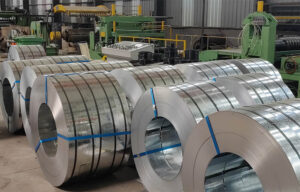 Galvanized Coils (Sheets/Strips)
Galvanized Coils (Sheets/Strips)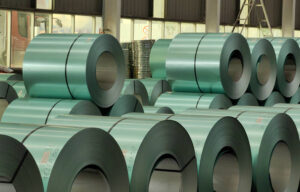 Galvalume Coils (Sheets/Strips)
Galvalume Coils (Sheets/Strips)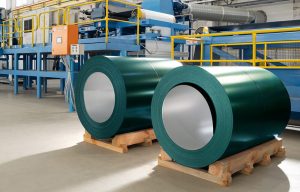 PPGI/PPGL Coils
PPGI/PPGL Coils Corrugated Roofing sheets
Corrugated Roofing sheets Hot Rolled Coils (Sheets/Strips)
Hot Rolled Coils (Sheets/Strips)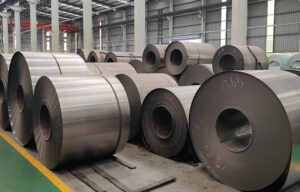 Cold Rolled Coils (Sheets/Strips)
Cold Rolled Coils (Sheets/Strips)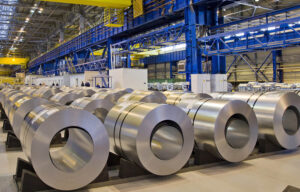 Aluminum Coils (Sheets)
Aluminum Coils (Sheets)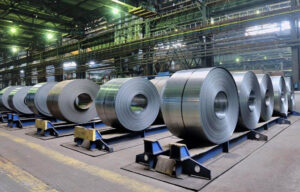 Tinplate Coils
Tinplate Coils